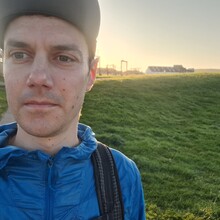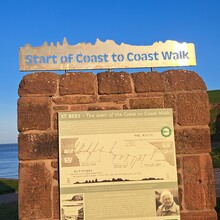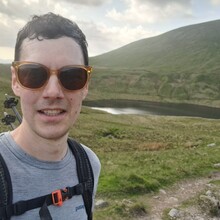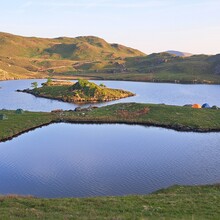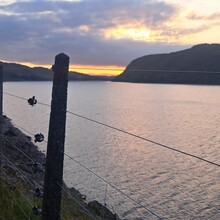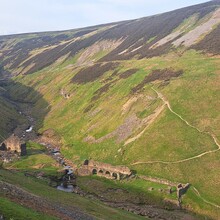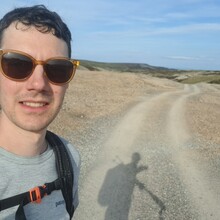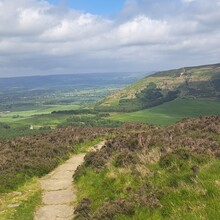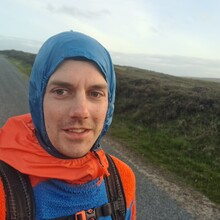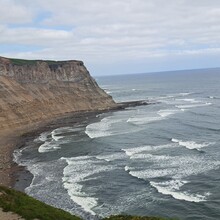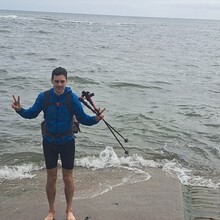Day 1
I wasn't pleased to be starting with only 5 hours of sleep. The train came into St Bees just before 22:00 and it took quite some time for me to relax and settle down. But ultimately, I don't think it was much of an issue, lack of sleep turned out to be much less of a factor than I expected.
This initial section was fast, with lots of smooth flat roads and tracks, I was also fresh and focused. I wasn't running, apart from perhaps the odd downhill, but a good pace can be achieved hiking as long as you stay focused on keeping up a fast stride. I managed to maintain 6 km/hour for the first six hours and held a decent pace beyond that as I hit the Lake District.
I pushed the pace on the climbs of the Lake District, but didn't dig too deep, the effort felt sustainable. I was sweating heavily in the heat. It was a very warm weekend, a factor that influenced my kit choice.
I suspect this sweating led to lowered salt levels late in the day and into the next day. Despite drinking plenty I wasn't retaining water and had some mild stomach cramping, which is usually an indicator of dehydration for me. I didn't eat enough of my salty snacks (toasted corn, pretzels) on day one, and got things back on track on day two.
I stopped a bit earlier than planned, I'd intended to keep moving until at least 23:00, but stopped around 22:00. I was happy to have gotten through the Lakes in one day. I was feeling strong. Better than I'd felt in the morning even, now that my muscles were warm and loosened up. It did feel wrong to be feeling good, aren't FKTs about pushing limits? But my rule of thumb is if you pace well you should feel really good in the first third of the effort.
Day two
The second morning had less flow than the previous day. It was harder to focus on keeping the pace up. The terrain also involved hopping from field to field with lots of gates and stiles to slow things down.
Between Shap and Kirkby Stephen is where I saw the most other walkers, generally out for the day (not carrying overnight equipment). I can't make sense of it, it's a pretty unremarkable section so I assume they're doing it as part of the entire Coast to Coast, but I didn't see anywhere near the same number of people on any other sections.
I had multiple sources for the route and sometimes they disagreed, which is unnerving for an FKT attempt. I followed signposts and markers first, otherwise, I followed the route from fastestknowntime.com (based on Damian Hall's run) on my watch, and where I couldn't make out where that was leading me I used the route from the Far Out app. Sometimes all three sources disagreed.
Having navigation on my watch while running has been a recent game-changer for me. Now I can't see myself hiking without my GPS watch, reducing the need to get my phone out is a big win.
I had recced the route in the winter of 2019/2020 ahead of the (cancelled) Northern Traverse race. After that recce-ing my conclusion was that once you reached Nine Standards you might as well turn around and head back to the Lakes, you had done all the worthwhile bits of the route. I'd now extend that as far as Reeth, this time around I enjoyed the waterfalls and old quarrying ruins.
I really enjoyed the first two days overall, I was having an adventure, I felt strong, the weather was great, and I had no major issues. I started to get pain below my right knee at the end of day two, I managed to alleviate it by stretching my hamstring.
Day three
I was much less quick to rise compared to the previous morning, I often find leaving the comfort of a sleeping bag hard. I eventually got myself up and sorted, and my first steps were agony. That pain below my knee was significantly worse. I had stretched my hamstring before setting off and there wasn't significant tightness there. I was wondering whether I should, or could, continue. On a hunch, I tried stretching my inner thigh, after a few seconds of stretching I went from limping to "running".
I was very pleased with this. I've been plagued by injuries recently, the root cause every time was tight muscles. But it would often take me weeks to establish where the tightness was. I've not yet worked out exactly where the root of the tightness is for this one, but I know enough to keep it at bay.
The next section involves lots of flat trails and roads. I slowly ran a lot of this, but my running pace was only as fast as my walking pace from the first day, around 9 minutes/km. I'm not sure whether running this was a mistake or not. Walking would have been more efficient, but it takes me a lot of mental effort to walk at 9 minutes/km, once I lose focus I revert to a more typical, slower, walking pace.
Going over the North Yorkshire Moors, the sun was no longer shining, the wind was strong, and I was feeling cold. Even after putting all of my clothes on I wasn't warm. I now believe that this cold was as much internal as external, i.e. my body just couldn't keep me warm anymore.
I had the desire to complete the remaining distance in one push, finishing under the three-day mark. But the idea of walking through the night was bringing my mood down. I relaxed my goal to reaching 100km for the day and told myself that once I hit 100km I could decide if I wanted to do more. As soon as the sun set, I was done for the day, my pace plummeted and tiredness kicked in.
When I saw a cricket ground I knew this was my sleep spot. Because of the fair forecast I had opted for an (old enough to no longer be anything-proof) bivy bag, it looked like rain could be possible so I wanted the shelter.
Day four
I was even slower to rise on day four. My usual trick of deflating my mat beneath me didn't work, the cold concrete held more appeal than moving. I eventually roused to a nauseous stomach, a churning mix of gas and acid. I hadn't drunk much over the moor the previous evening and had let myself get dehydrated.
My plan was to:
- stretch to get myself mobile
- gradually rehydrate
- get some food down
I never reached step three of the plan, aside from a handful of pretzels mixed into my water bottles. I now believe there was more to my stomach problems than just dehydration. My stomach still wasn't quite right 24 hours after finishing.
The wheels truly fell off for the final 26km. I stopped caring about finish time, pace, or keeping moving. I even stopped to sit down within 2km of the finish just because there was a bench to sit on, I just wasn't functioning.
My only feeling at the finish was relief.
Despite no feeling of joy at the end and mood spiraling in the final day, I'm already thinking about what I would do differently on a different attempt. I'm struggling to work out what draws me towards FKTs. I do know that I'd approach the next one with a different mindset. I had felt "guilty" early in the trip for feeling good, like I wasn't trying hard enough. So many FKT reports describe continuing through fatigue, stomach issues, injury, etc, that this seems like the goal. But it isn't. I believe the goal is to stay in the "feeling good" zone, this is where you will perform at your best. This will be my main priority in any future attempt.

